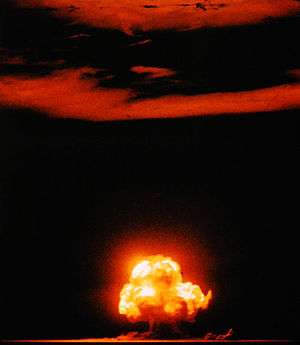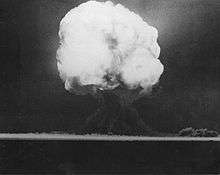Jack Aeby


Jack W. Aeby (/ˈæbi/; August 16, 1923 – June 19, 2015) was an American environmental physicist most famous for having taken the only well-exposed color photograph of the first detonation of a nuclear weapon on July 16, 1945 at the Trinity nuclear test site in New Mexico.[2][3] While color motion pictures of the Trinity test were made, most were badly overexposed or damaged due to the fireball's tendency to blister and solarize the film. Aeby was a civilian assigned to the Health Physics Group with Emilio Segrè at the time his snapshot was taken.[3]
Aeby is a source for a story about a notable estimate made by Enrico Fermi at that test:[1]
As the shock wave hit Base Camp, Aeby saw Enrico Fermi with a handful of torn paper. "He was dribbling it in the air. When the shock wave came it moved the confetti."Fermi had just estimated the yield of the first nuclear explosion at the equivalent of 10,000 tons of TNT. Later measures put the yield nearly twice as much, at 18.6 kilotons. And this terrible new energy came from a plutonium ball weighing 13.6 pounds.[1]
The photo was taken with a Perfex 33 with a 35mm lens, using a shutter speed of 1/100 at f4 and Anscochrome color film.
Aeby joined the Manhattan Project in 1942 and through his work with the Los Alamos National Laboratory witnessed nearly 100 nuclear explosions. He lived in the Española Valley in northern New Mexico with his wife Jeanne. They had 5 children. Aeby died at his home in Española in 2015.[4]
Photos of Aeby
 Aeby in 1944 with his Perfex 33
Aeby in 1944 with his Perfex 33 Aeby in 2014
Aeby in 2014
See also
- Berlyn Brixner – official Trinity test photographer
Notes
- 1 2 3 Calloway, Larry. "The Nuclear Age's Blinding Dawn". Albuquerque Journal. Retrieved 2015-03-20.
- ↑ "In Memoriam: Jack Aeby". Atomic Heritage Foundation. June 23, 2015. Retrieved 24 June 2015.
- 1 2 "NM man who took only color photo of Trinity test dies at 91". www.KOB.com.
- ↑ Victoria (Australia)
References
- Jeffrey, Ian (2014). The Photography Book (2nd ed.). London: Phaidon Press. ISBN 9780714867380.
Further reading
- Kelly, Cynthia C. (August 2003). "Jack Aeby's Interview". Voices of the Manhattan Project. Atomic Heritage Foundation. Retrieved 2016-08-03.
- Melnick, Aj (2006). They Changed the World: People of the Manhattan Project. Sunstone Press. pp. 14–15. ISBN 9780865345300.
- Siegel, Robert (July 15, 2005). "Photographing the Dawn of the Nuclear Age". All Things Considered (transcript). NPR. Retrieved 2015-03-20.
- "Trinity (color Photograph): Trinity Test Site (July 16, 1945)". The Manhattan Project: An Interactive History. U.S. Department of Energy- Office of History and Heritage Resources. Retrieved 2015-03-20.
External links
| Wikimedia Commons has media related to Jack Aeby. |
- 2003 Video Interview with Jack Aeby by Atomic Heritage Foundation Voices of the Manhattan Project
- Jack Aeby, Atom-Bomb Photographer (MP3) on NPR's All Things Considered (July 15, 2005)
- Jack Aeby exhibit at the Los Alamos Historical Museum (photos), The Los Alamos Monitor
